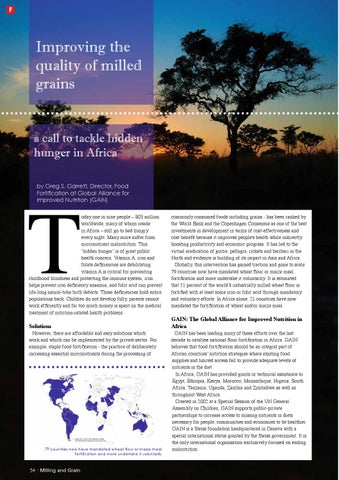F
Improving the quality of milled grains
a call to tackle hidden hunger in Africa
T
commonly consumed foods including grains - has been ranked by the World Bank and the Copenhagen Consensus as one of the best investments in development in terms of cost-effectiveness and cost:benefit because it improves people's health while indirectly boosting productivity and economic progress. It has led to the virtual eradication of goitre, pellagra, rickets and beriberi in the North and evidence is building of its impact in Asia and Africa. Globally, this intervention has gained traction and gone to scale. 79 countries now have mandated wheat flour or maize meal fortification and more undertake it voluntarily. It is estimated that 31 percent of the world’s industrially milled wheat flour is fortified with at least some iron or folic acid through mandatory and voluntary efforts. In Africa alone, 21 countries have now mandated the fortification of wheat and/or maize meal.
Solutions
GAIN: The Global Alliance for Improved Nutrition in Africa
by Greg S. Garrett, Director, Food Fortification at Global Alliance for Improved Nutrition (GAIN)
oday one in nine people – 805 million worldwide, many of whom reside in Africa – still go to bed hungry every night. Many more suffer from micronutrient malnutrition. This ‘hidden hunger’ is of great public health concern. Vitamin A, iron and folate deficiencies are debilitating: vitamin A is critical for preventing childhood blindness and protecting the immune system; iron helps prevent iron deficiency anaemia; and folic acid can prevent life-long neural-tube birth defects. These deficiencies hold entire populations back. Children do not develop fully, parents cannot work efficiently and far too much money is spent on the medical treatment of nutrition-related health problems. However, there are affordable and easy solutions which work and which can be implemented by the private sector. For example, staple food fortification - the practice of deliberately increasing essential micronutrients during the processing of
79 countries now have mandated wheat flour or maize meal fortification and more undertake it voluntarily
54 | Milling and Grain
GAIN has been leading many of these efforts over the last decade to catalyse national flour fortification in Africa. GAIN believes that food fortification should be an integral part of African countries’ nutrition strategies where existing food supplies and limited access fail to provide adequate levels of nutrients in the diet. In Africa, GAIN has provided grants or technical assistance to Egypt, Ethiopia, Kenya, Morocco, Mozambique, Nigeria, South Africa, Tanzania, Uganda, Zambia and Zimbabwe as well as throughout West Africa. Created in 2002 at a Special Session of the UN General Assembly on Children, GAIN supports public-private partnerships to increase access to missing nutrients in diets necessary for people, communities and economies to be healthier. GAIN is a Swiss foundation headquartered in Geneva with a special international status granted by the Swiss government. It is the only international organisation exclusively focused on ending malnutrition.
